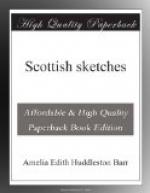Crawford had said a bitter word about her coming to the Keep, and Tallisker could not help thinking what a blessing she would be there; for one of Crawford’s great troubles now was the wretchedness of his household arrangements. The dainty cleanliness and order which had ruled it during Helen’s life were quite departed. The garden was neglected, and all was disorder and discomfort. Now it is really wonderful how much of the solid comfort of life depends upon a well-arranged home, and the home must depend upon some woman. Men may mar the happiness of a household, but they cannot make it. Women are the happiness makers. The laird never thought of it in this light, but he did know that he was very uncomfortable.
“I canna even get my porridge made right,” he said fretfully to the dominie.
“You should hae a proper person o’er them ne’er-do-weel servants o’ yours, laird. I ken one that will do you.”
“Wha is she?”
“A Mrs. Hope.”
“A widow?”
“No, not a widow, but she is not living with her husband.”
“Then she’ll ne’er win into my house, dominie.”
“She has good and sufficient reasons. I uphold her. Do you think I would sanction aught wrong, laird?”
No more was said at that time, but a month afterwards Mrs. Hope had walked into the Keep and taken everything in her clever little hands. Drunken, thieving, idle servants had been replaced by men and women thoroughly capable and efficient. The laird’s tastes were studied, his wants anticipated, his home became bright, restful, and quiet. The woman was young and wonderfully pretty, and Crawford soon began to watch her with a genuine interest.
“She’ll be ane o’ the Hopes o’ Beaton,” he thought; “she is vera like them.”
At any rate he improved under her sway, for being thoroughly comfortable himself, he was inclined to have consideration for others.
One afternoon, as he came from the works, it began to snow. He turned aside to the manse to borrow a plaid of Tallisker. He very seldom went to the manse, but in the keen, driving snow the cheerful fire gleaming through the window looked very inviting. He thought he would go in and take a cup of tea with Tallisker.
“Come awa in, laird,” cried old Janet, “come awa in. You are a sight good for sair e’en. The dominie will be back anon, and I’ll gie ye a drap o’ hot tay till he comes.”
So the laird went in, and the first thing he saw was Colin’s picture of “The Clan’s Farewell.” It moved him to his very heart. He divined at once whose work it was, and he felt that it was wonderful. It must be acknowledged, too, that he was greatly pleased with Colin’s conception of himself.
“I’m no a bad-looking Crawford,” he thought complacently; “the lad has had a vera clear notion o’ what he was doing.”
Personal flattery is very subtle and agreeable. Colin rose in his father’s opinion that hour.




